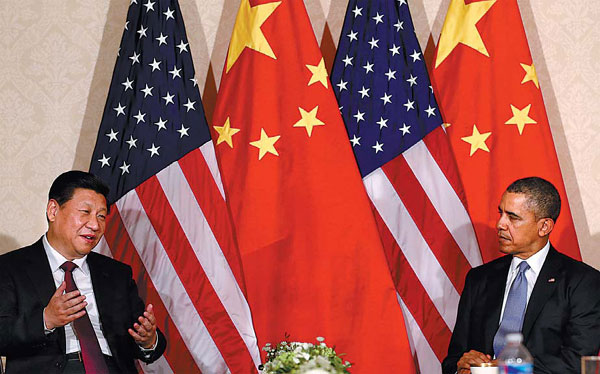Misreadings and misjudgments
Updated: 2015-04-30 07:44
(China Daily)
|
|||||||||||
 |
|
Chinese President Xi Jinping, left, meets with his US counterpart Barack Obama on the sidelines of the Nuclear Security Summit in The Hague on March 24, 2014. [Photo/Agencies] |
Recently, some US scholars have once again suggested China's collapse, a pessimistic outlook on China that has been raised from time to time by Western academics or the media.
The forecast of China's collapse, which has alternated with a China threat and China's disregard for rules, is a result of their misunderstanding of the country.
China studies in the United States are focused on its politics and negative aspects of the country, including its social contradictions, human rights, ethnic conflicts, mass incidents, as well as issues related to China's Tibet and Xinjiang Uygur autonomous regions. It is easier for such research topics, which exaggerate China's "dark side" and draw gloomy conclusions, to gain subsidies from the government.
The haunting Cold War mentality has also caused some US scholars to focus on negative issues in China and other countries not viewed as a part of the Western camp to create a pretext for possible diplomatic interventions and military spendings. In the era of economic globalization and power multi-polarization, such an academic preference is incompatible with the fundamental requirement that academic studies should present an objective picture so that governments can base their foreign policies on correct judgments.
Misjudgments about China's development among some US researchers have also contributed to their misperceptions. In fact, the US' misjudgments about China over the past decades, from its misjudgment about the founding of New China to its misjudgment about China's reform and opening-up, have caused many US scholars to study China not from the perspectives of its concrete national conditions, system and development path, but from the perspective of the US' own political standards.
Chinese people have a long-cherished belief that "among three people, there must be one who can be my teacher". China's academic studies on other countries thus focus on what China can learn from them. US scholars could learn from China's academic approach.
The above is an abridgement of a People's Daily article published on Wednesday.
Related Stories
Experts call for China-US cooperation on renewable energy 2015-04-21 10:16
China, US to exchange negative lists soon 2015-04-19 10:41
China-US cyber cooperation encouraged 2015-04-02 11:06
China, US 'cannot afford' maritime dispute 2015-03-30 07:38
Today's Top News
China hits out as Abe visits the US
US Senate rejects bid to toughen Iran nuclear review bill
New Zealand voices dismay at executions in Indonesia
No hiding place overseas for fugitive officials
Nepalis wait for quake help as death toll passes 4,000
Australia recalls ambassador after Indonesia executes drug smuggling pair
61 suspects back home to be tried
PLA's Moscow debut confirmed
Hot Topics
Lunar probe , China growth forecasts, Emission rules get tougher, China seen through 'colored lens', International board,
Editor's Picks

|

|

|

|

|

|






